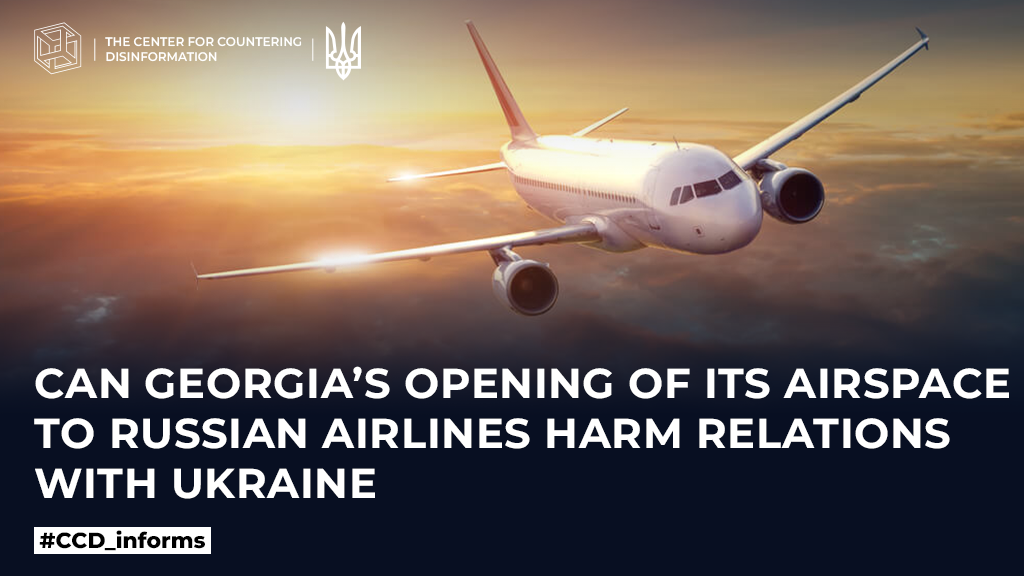On May 19, for the first time in almost 4 years, a plane from the Russian airline “Azimut” landed at Tbilisi Airport on the Moscow-Tbilisi flight. This is a response from the Georgian government to putin’s decision to cancel the visa regime for Georgian citizens froь May 10 and lift the ban on russian airlines flights to Georgia. At first, the Georgian authorities stated that only those russian companies that do not fall under international sanctions would be allowed to operate flights. However, these statements were undermined by the fact that “Azimut” airline is under Ukrainian sanctions for flights to the occupied Crimea.
The event gained international resonance. The U.S. Department of State expressed concerns about the resumption of interaction with the russian federation and warned Georgia about the potential consequences. The Ministry of Foreign Affairs of Ukraine criticized the resumption of flights and accused Georgia of attempting to normalize relations with russia when the rest of the world is isolating the aggressor to end the war against Ukraine. The European Union stated that Georgia’s decision raises doubts about its European course as it contradicts the Georgia-EU Association
Agreement, which requires the country to coordinate its foreign policy decisions with those of the EU. Georgian President S. Zurabishvili called moscow’s decision as a “provocation” that would provoke political tension in the country.
Despite calls from the EU to refrain from such rapprochement with the kremlin, the threat of damaging relations with Ukraine, and the potential American sanctions against Georgian companies, the Georgian government has not changed its decision.
What lies behind such “principled” stance of Tbilisi?
Certain circumstances provide grounds to believe that the illogical actions of the Georgian leadership are driven by the interests of the kremlin.
Firstly, the current Georgian government is pursuing the establishment of relations with russia under the formal pretext of protecting the national interests of the population by supposedly mitigating the risk of escalation between the two countries and military conflict with russia. In reality, the kremlin is using the rapprochement with Georgia as an additional argument to compel the “collective West” to initiate a negotiation process on its own terms regarding Ukraine.
Secondly, the intense confrontation between the pro-Western President of Georgia, S. Zurabishvili, and the pro-russian leadership of the Georgian Parliament significantly undermines its European and Euro-Atlantic aspirations, which is a strategic goal of the kremlin in preventing Alliance expansion to the East.
Thirdly, according to Israeli political technologist M. Shaitelman, russia’s influence on Georgia’s domestic politics is exercised through the former Prime Minister Bidzina Ivanishvili, who is the founder of the “Georgian Dream” party and is still considered an unofficial leader of Georgia despite officially retiring from politics. In the previous parliamentary elections, the “Georgian Dream” party emerged victorious, receiving over 45% of electoral support. This enables kremlin lobbyists to promote decisions that undermine Georgia’s European and Euro-Atlantic aspirations. In June 2022, the European Parliament adopted a resolution calling for sanctions against Ivanishvili, referring to him as an “oligarch” associated with the Kremlin and exerting a negative influence on the development of democracy in Georgia. It is precisely due to Ivanishvili’s close ties with the russian political elite that the Georgian government does not support Ukraine in its war against russia.
Regarding the “fruitful” cooperation between the Georgian government and the kremlin, its response to the war against Ukraine speaks volumes. Since the full-scale russian invasion of Ukraine began, Georgia has adopted a neutral position, refusing to impose sanctions on the kremlin regime and provide military
assistance to Kyiv. This year, in March, the Georgian government made a series of unfriendly statements towards Ukraine. Almost word for word echoing russian propaganda, representatives of the Georgian government accused Ukraine of plotting a state coup in Georgia, involving Georgia in a war with russia, and deploying forces to fuel a civil war.
What can Ukraine and the world expect next?
The influence of the russian government on the situation largely depends on the position of the parliament, as Georgia is a parliamentary republic where the president’s powers are significantly limited. Recent events indicate a catastrophic decrease in popular support for the “Georgian Dream” party, which pushes through the necessary laws in parliament. Georgians are not willing to forgive the Ivanishvili party for the war of 08.08.2008, as a result of which russia still occupies 20% of Georgia’s territory (similar to the essence of the war in Ukraine).
It can be argued that since February 24, 2022, Georgian civil society has become absolutely anti-russian, which, against the backdrop of the actions of the current Georgian government, provides ample grounds for its removal in the upcoming parliamentary elections or as a result of a popular uprising.
The support of Ukraine by the Georgian people is the foundation of strategic relations between the two countries. Ukraine has been and will remain a friend of the Georgian population, and no decisions made by pro-russian Georgian politicians can undermine the friendly relations between the Ukrainian and Georgian peoples.










